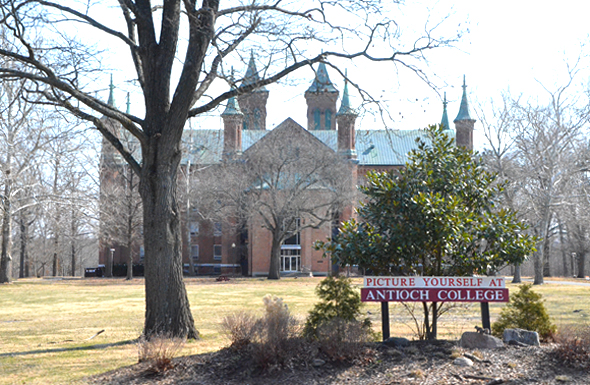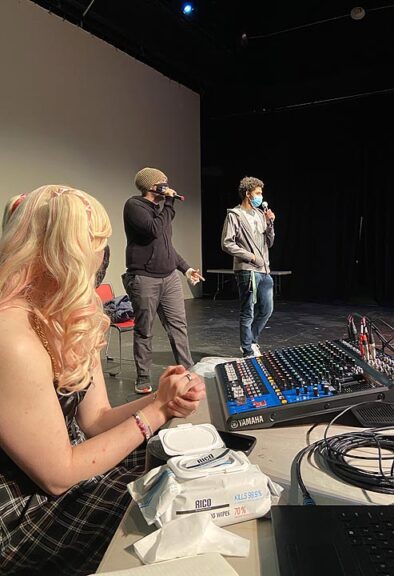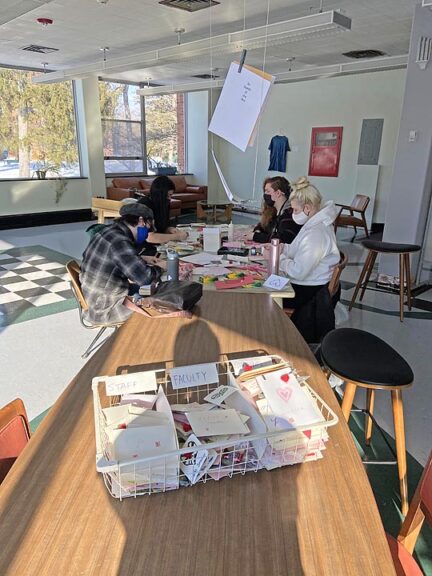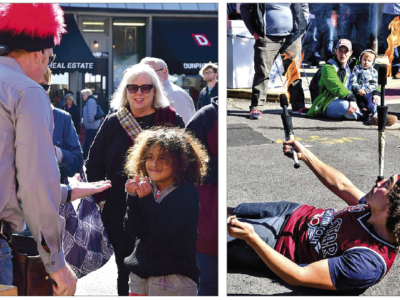
Antioch College continues to work with the Yellow Springs Community Foundation to stabilize Antioch Hall, also known as Main Building, after the foundation raised a half-million dollars for the effort. (Photo by Reilly Dixon)
Antioch adapts, holds on
- Published: March 29, 2021
The cancellations, closures, cuts and crises came swiftly at Antioch College during the pandemic year of 2020.
In mid-March, classes at Antioch moved online for what turned out to be the remainder of the school year, and the Antioch Wellness Center shuttered a few days later. Soon after, students moved out of residence halls, campus was closed to any visitors and the college’s then-nature preserve, Glen Helen, was roped off to hikers.
Already reeling from a record-low fall enrollment of 27 students in the fall of 2019, the college responded to pandemic-related financial losses with sweeping furloughs, followed by the deepest budget reductions since the college’s rebirth, including faculty cuts. After the future of the Glen was thrown into crisis, the college parted ways with the nature preserve it had stewarded since 1929, selling it to the Glen Helen Association. And President Tom Manley announced his retirement.
Wellness Center remains closed
Citing concern for the “health and welfare of students and our community,” Antioch College Vice President for Operations and Business Hannah Montgomery confirmed this week that the Antioch Wellness Center would stay closed for the time being.
The Wellness Center has not been open since March 14, 2020. Although gyms and fitness centers in the state were given the green light to reopen on May 26, 2020, Antioch chose a more conservative approach.
According to Montgomery, that decision was made due to the higher than average age of the center’s members. Other considerations were the importance of keeping students living on campus safe and healthy and “our financial ability to support the Wellness Center when it is not at full capacity,” Montgomery wrote in an email.
Asked about the financial impact of the Wellness Center’s closure, Montgomery wrote that it was “budget neutral” and that the center was not a “significant revenue generator” for the college.
Memberships are currently on hold, Montgomery confirmed, and no fees are being deducted from members during the closure.
In the meantime, the pool has been drained and maintenance is ongoing, Montgomery wrote.
No details were given about when the center may reopen, only that the college is “continuously re-evaluating the COVID-19 risk.”
For a fledgling institution 10 years into its new incarnation, the COVID-19 pandemic brought additional challenges and scrutiny. All the while, Antioch angled to set itself apart as a progressive institution that supports student efforts for social justice while offering real-world experience via co-ops and campus work, all in a time of transformation in higher education and general social upheaval.
After an admittedly difficult year, there are signs of hope, according to several faculty members and administrators. Fifty first-year students enrolled in fall 2020 in what was hailed as a positive step for recruitment. The campus reopened with a combination of in-person and hybrid courses, and since then the school has reported just 12 positive COVID-19 cases among students, staff and faculty.
Plus, a nationwide search for the college’s next president is underway. And recently, 11 faculty members were moved to tenure-track positions in a step likely to improve faculty retention.
“It’s definitely been a challenge,” Vice President of Academic Affairs Kevin McGruder said in a recent phone interview. “Now we’re in a rebuilding stage.”
Reflecting on the year, Dean of Students Mila Cooper said she is impressed with how students have kept each other safe while continuing their studies, all in a world dealing with uncertainty and grief.
“I honestly couldn’t imagine being a younger person at this time, focusing on this paper or this test, during this past year when death has been all around us,” she said.
“I’m really proud of our students — they have done a really good job keeping each other safe,” Cooper added.
Looking ahead, Antioch may be getting a new president as early as this summer. A committee of 22 is working with a national firm to find a good fit. To Cooper, the extensive process is itself cause for optimism about the college’s future.
“The fact that we have launched a national search for a president, in part based upon the belief that we have a sustainable college and something worth fighting for,” is hopeful, she said. “Looking for our next leader is a positive step.”
On campus during COVID
As with other institutions of higher education, Antioch adapted during the pandemic. Relying on a combination of in-person, hybrid and fully online education resulted in reduced risk and allowed students to live and study on campus since the fall. This winter term, Antioch has 112 students enrolled, 90% of whom are on campus, according to McGruder.
“In some ways, being small has worked in our favor,” he said of the college’s success at limiting the spread of COVID-19.
The college did have an outbreak in mid-December, during the height of the pandemic, when six students and one staff member tested positive over several days, representing one-third of all students in residence at the time. Three more cases were added by year’s end.
Prior to that, in the fall, Antioch recorded one case, and since the start of the new term in January, one more case has been added. The college declined to share the breakdown of students, staff and faculty for the 12 cumulative cases.
Cooper said that besides “a few slip-ups” students have been diligent about preventing spread. Although it’s been challenging to build community when in-person gathering is limited, students and staff have been resilient, as well as creative, at coming up with ways to be together.
“How do you engage socially, how do we orient and welcome new students, when we’re all wearing masks?” Cooper said.
But traditions were adapted, and new ones started. New students spread out in South Gym for orientation, practiced “yoga on the lawn” earlier in the year and hosted outdoor karaoke nights and movie nights. When the weather turned cold, virtual open mic nights, online poetry readings and speakers were hosted.
“People are so exhausted of the screen time, but we were able to put on some of our programs,” Cooper noted. “Winter has been kind of tough.”
Meanwhile, one of the college’s signature programs — co-op — has also changed in the era of COVID.

Cara Stedman, class of 2022, drew messages of love and affirmation on campus mirrors for Valentine’s Day. (Submitted photo)
According to Brooke Blackmon Bryan, the new Dean of Cooperative, Experiential, and International Education, some students “re-sequenced” their academic plans to buy themselves time to work at planned jobs. Others had virtual employment experiences, or stayed closer to home, and some opted for a position at a local organization through the Miller Fellow program run by the Yellow Springs Community Foundation.
“COVID has definitely impacted our ability to get students where they want to go,” Bryan said.
Fundamentally, co-op is more than a job, she said; it’s a critical part of a student’s growth.
“A big part is moving to a new city, learning how to find a place to live, taking public transportation,” she said. “They expedite their development.”
One silver lining is that students have invested more time into college activities on campus as part of the Antioch College Works plan announced in January 2020, Bryan said. That plan guarantees free tuition for Pell Grant-eligible students if they work 10 hours per week on campus or in the community. As part of that effort, 56 students are working in campus jobs this term, Bryan noted.
“Through that work, students are able to run independent student groups. They are able to take up student publications,” she said, including work to revive the Antioch Record, a student-run paper that published its most recent issue in October 2018.
Students also revived a low-watt, FCC-licensed radio station, on campus — Anti-Watt — which can be heard at 101.5 FM or streamed online.
Bryan is hopeful students will soon be able to strike out across the country and world for co-op, which she believes is the feature that distinguishes Antioch from other liberal arts institutions.
“Co-op at Antioch is not a one-off experience, and it’s not internships; it’s a fundamental part of the student sequence and has been since 1921,” she said.
Student perspectives
College life during a pandemic has its complications, and tensions have arisen along the way. In interviews with fellow students in September 2020, fourth-year student Truth Garrett learned that while some were grateful to be able to attend college in-person, others were frustrated by COVID-19 restrictions. Campus, he observed, had the “eerie feeling of a ghost town” at times.
Second-year student Samantha Maxwell believes that the pandemic may have helped the college attract students who didn’t want to attend their first quarter of college remotely.
“Surprisingly enough, I think COVID-19 helped,” Maxwell said. “The new students are really excited to come to a school that is open with learning in-person.”
For Maxwell, there’s another potential benefit to the COVID-19 restrictions.
“I think it’s keeping people focused on their studies, so I don’t think that’s necessarily a bad thing,” she said.

Recently, Antioch College students participated in Community Day with some socially distanced, masked karaoke in the Foundry Theater. Campus life has been upended since the pandemic, but students and staff are adapting traditions and creating new ones. (Submitted photo by Antioch Community Manager Coco Gagnet)
But for some returning students who remember campus life pre-COVID, it was a hard adjustment. Ray Graham, a second-year student from Brooklyn, N.Y., found that students were spending more time alone in their rooms, as few places on campus were available for gathering.
“My freshman year there was more closeness, but now with COVID that togetherness stuff can’t happen anymore,” Graham said.
One campus space students were eager to see reopened was Weston Hall, the student union. Students became increasingly vocal about the need for that space as the weather grew cold, according to Garrett. Eventually, it was reopened in the fall, then shut temporarily during the December outbreak. Now, Weston is open by appointment during the week, with open hours on the weekend.
Also remaining closed was the Wellness Center. Meanwhile, some students connected to one another by playing video games.
A “sense of unrest” prompted some students to organize a kickball game on campus over Labor Day, according to Garrett, which led to some heated conversations among students and between students and administrators. At another time, students aired disappointment about having to pick up meals from the dining hall at designated times and eat them in their rooms.
And the presence of race-related tension on campus came to light after a student accused a staff member of targeting him for mask compliance because he is Black. The student posted his story publicly on a local Facebook discussion group in February 2021.
In response to such incidents, as well as an ongoing national reckoning about racism, administrators have worked with students to provide education, conflict resolution tools and other support, according to Cooper and MacGruder, who are both Black.
“We have an essential role and we have an obligation to help students acknowledge these issues, provide tools that empower them to work through them,” Cooper said.
Both added that the campus is not immune to the prejudices of the wider world.
Cooper pointed to the school’s racial descrimination policy, updated by students a few years ago, as one avenue for addressing such issues. In addition, the Community Manager position was brought back at the start of the school year so students could advocate for their needs.
McGruder believes that the college’s relatively new required course Dialogue Across Difference is helping students navigate conflicts across ethnic, gender and other lines. As a predominantly white institution, though, Antioch as a whole, needs to change in order to create a more welcoming place for a diverse student body, McGruder said.
“For the Black students who have grievances, when you are 18 or 19 or 20 and you’re encountering negative experiences at a place you thought you would be welcomed, it is extremely disappointing,” he said.
During COVID, having such courageous conversations has been a challenge.
“That is a disadvantage we have because of COVID, that we can’t get into a room and talk about it and online spaces are difficult,” he said.
Presidential search underway
Others on campus are focused on the college’s future with the launching of a search for a new president, which got underway in February.
Last August, Antioch announced that President Tom Manley would be stepping down from his post at the end of his five-year contract in June 2021. Manley departed earlier than expected, at the end of November, due to health issues.
Chairing the search committee is Ro Nita Hawes-Saunders, chief executive officer of the Dayton Contemporary Dance Company. The committee is made up of a mix of board members, students, faculty and staff and Yellow Springs community members.
Hawes-Saunders has been on the board at Denison University for 24 years, in addition to other positions in the field of higher education, and brings a passion for higher education and the liberal arts, she said in a recent interview.
“This is an opportunity for the college and the community to be bold and brave as they move forward in the landscape of higher education,” she said. “I feel privileged and I look forward to helping to find the right candidate.”
The college has contracted with a Washington, D.C.-based firm, Academic Search, and is working with consultant John Garland, the former president of Central State University. If the committee finds the right person, Hawes-Saunders said, a selection could take place in June. Otherwise, the committee will narrow down the options to a few candidates who will then proceed to a final round of interviews.
The committee has plans to conduct “listening sessions” with faculty, alumni and select Yellow Springs community members to hear what they want in a president, Hawes-Saunders explained. Asked what qualities the committee is looking for, she said the committee has not yet created a profile, but that they are open to many possible backgrounds.
“Individuals who are interested in this type of position are no longer on a single track. They can come from academe, from business, from a broad spectrum of fields,” she said.
Hawes-Saunders added that the person should have an understanding of the college’s core values. And while the committee is not looking for a single leadership style, college presidents must be able to see the opportunity in a changing higher education environment, she believes.
“As an individual wanting to lead a college today, you must have a broad approach and understand the world of technology and the world of young people, who have had more access to learning tools than any previous generation,” she said.
“The opportunity to educate and frame the minds of young people today is quite extraordinary,” she added. “The person should understand that scope.”
Strategies for survival
Back on campus, those interviewed recently continue to believe in Antioch College’s unique role in the world, while acknowledging the uphill battles for reviving a liberal arts college at a time when its traditional revenue model is changing.
For Cooper, COVID has tested the college when it was already struggling to survive. The college is still looking to “find the right mix of student-derived revenue and philanthropy” to operate. So far, though, Antioch continues on, and enrollment and retention are both moving in a positive direction.
“I am hopeful that things are going to improve,” she said.

Students made valentines for other students, staff, and faculty in the Olive Kettering Library last month. (Submitted photo by Antioch Community Manager Coco Gagnet)
Pursuant to his role, McGruder has been focused on “faculty cohesion.” After working through the departure of six of his colleagues last spring, he sought to get new protections for faculty members. Now, 11 faculty members, some of whom were formerly in visiting roles, are on a tenure track, a recent move that McGruder believes will encourage faculty retention and allow faculty to help “envision a future they will be a part of.”
“It can’t guarantee that people won’t leave, but there is some reciprocity there when we’re asking people to advise students, to plan curricula,” he said. “It will be a big plus moving forward.”
McGruder joined the faculty nine years ago in one of six existing tenure-track positions, and received tenure a few years ago. He’s been through periods of ups and down at the college, but still believes it is a draw for the right student.
“We are continuing to be optimistic,” he said. “We do feel that for specific types of students, we have something to offer, specifically those looking for colleges of 1,000 or less and who want to have a say in what they study.”
Other strategies to secure Antioch’s future have varied in recent years. Some plans to diversify revenue, such as the Antioch College Village housing development, failed to materialize. At other times, the college sold off assets such as WYSO and the Glen for an infusion of cash and a streamlining of operations. Other long-standing college operations, such as the Antioch Review, fell by the wayside due to revenue constraints.
Antioch College Vice President for Operations and Business Hannah Montgomery wrote in a recent email she does not view measures such as parting ways with WYSO and the Glen as intentions to divest, but as a way to “find the best opportunities for all concerned.”
“The College is committed to preserving beloved institutions and ensuring that the operations of the College serve to the local and public benefit of all community members,” she wrote.
According to Montgomery, the college does not have information to share about other possible areas of its operation that may be sold or transitioned to new ownership, such as the Wellness Center. However, the News has learned that Antioch has indicated an openness to selling Rockford Chapel to the group currently leasing that space.
Meanwhile, the college continues to work with the Yellow Springs Community Foundation to stabilize Antioch Hall, also known as Main Building, after the foundation raised a half-million dollars for the effort.
Bryan said Antioch is also exploring whether it can offer to other colleges the “research opportunities and national and international immersions” of its co-op program. In response to a “broken fiscal model,” it’s also looking at how students can get college credit for other types of experiential learning, Bryan said.
“Young adults today don’t want to live in a bubble-wrapped campus,” she said. “Our students are students of the world.”
Antioch’s foray into these new possibilities is not unique, Bryan noted. Many liberal arts colleges are in a similar place.
“One thing I’ve learned is that all of our sister colleges are experiencing great transition. For me it’s not a question of will Antioch survive, but what will the future of Antioch look like when Antioch thrives.”
*Truth Garrett, a Yellow Springs Community Foundation Miller Fellow who worked for the News in fall 2020, also contributed reporting for this story.
5 Responses to “Antioch adapts, holds on”
The Yellow Springs News encourages respectful discussion of this article.
You must login to post a comment.
Don't have a login? Register for a free YSNews.com account.













Great YS NEWS updated 2021 coverage about the never ending trials and travails of Antioch College Ohio, which always “down” but never “out!”
Antioch survives, by a hook and crook!
It reminds me of Dr. Samuel Johnson’s famous observation about a dog walking on its hind legs!
“Amazing that it is even walking at all!” said Johnson!
True of Antioch College Ohio in 2021!
Keep up the good work, Antioch!
Horace Mann would be proud!
After all these years of “reinventing” itself – Antioch administrators still don’t “get it.” Antioch offers an antiquated approach to education – its sole mission is to indoctrinate young people with leftist propaganda. Other schools focus on providing students with cutting-edge skills to compete for jobs of the future, while Antioch judges success on the number of minds it can infiltrate with socialist ideology. A losing proposition.
A nephew of mine in roughly eight years ago attended Antioch because he thought it would expand his horizons to think more broadly about the world. Instead, because he was wasn’t liberal enough, he was ostracized by both faculty and administrators. Diversity of thought is not a goal at Antioch. Sad.
Isn’t it possible to keep some architectural aspects of the main building for ‘historical sentiment’ and attach it to something more conducive to the college’s current needs and enrollment?
Hi David! Antioch has spent tens of millions on its facilities since its separation from the university (including major renovations at the science building, gymnasium, Foundry Theater, Birch and North Hall dormitories, plus geothermal and solar installations). However, none of those plans have included renovations at Antioch Hall (Main Building). The original master plan called for renovations in phases, with Main Building to be renovated in 2020. But that never came to pass. In one interview with President Mark Roosevelt, he said the initial cost estimate for a complete campus reno was $30, but that in truth it would take closer to $100 million. Here is a story we ran about the YS Community Foundation stepping in to get main building stabilized while we wait for a renovation plan: https://ysnews.com/news/2019/11/a-new-vision-for-antioch-hall
Thank you, Megan, for this great review of the recent and current happenings at Antioch. I really appreciate all the details and summaries of the College’s status.
One thing I don’t understand, however, is why the Main Building now needs “stabilizing”. I thought that a large amount of money was spent when the college reopened (including monies to repair and stabilize Antioch Hall/The Main Building).